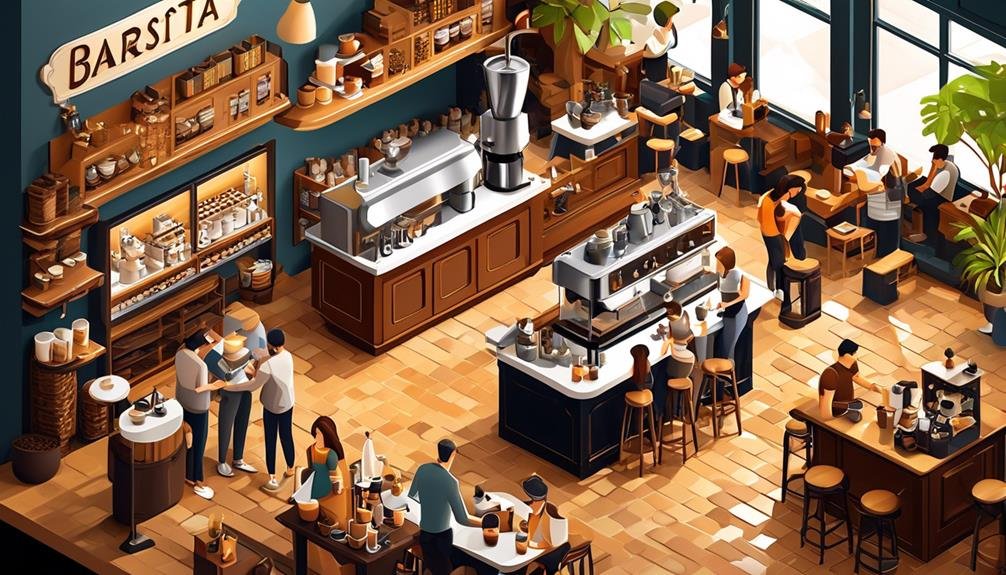As you sip on your morning cup of joe, have you ever wondered about the fascinating world of coffee beyond your favorite brew? The coffee industry is constantly evolving, and there are several intriguing trends that are shaping the way we enjoy our beloved beverage.
From the rise of alternative brewing methods to the integration of technology in coffee production and consumption, there is a lot happening in this dynamic industry.
So, grab your mug and prepare to explore the exciting and ever-changing landscape of coffee.
Key Takeaways
- Surge in demand for specialty coffee and the rise of coffee culture
- Emphasis on sustainability and ethical sourcing
- Growth of coffee tourism and immersive coffee experiences
- Integration of technology in coffee production and consumption
Increasing Demand for Specialty Coffee
Specialty coffee is experiencing a significant surge in demand, driven by discerning consumers seeking a higher quality and more unique coffee experience. In recent years, there's been a noticeable shift in consumer preferences towards specialty coffee. This trend can be attributed to several factors.
Firstly, consumers are becoming more knowledgeable about coffee and its various flavors and profiles. They're no longer satisfied with the generic, mass-produced coffee that lacks depth and complexity. Instead, they're seeking out specialty coffee, which offers a more refined and personalized taste experience.
Furthermore, the rise of coffee culture and the proliferation of specialty coffee shops have contributed to the increased demand. These establishments provide an environment where consumers can explore and appreciate different coffee origins, brewing methods, and flavor profiles. This has created a sense of curiosity and adventure among coffee lovers, driving them towards specialty coffee.
Additionally, the growing emphasis on sustainability and ethical sourcing has also played a role in the increased demand for specialty coffee. Consumers are now more conscious of the environmental and social impact of their purchasing decisions. They're actively seeking out coffee that's ethically sourced, supporting farmers and communities in coffee-growing regions.
Rise of Alternative Brewing Methods
As consumer demand for specialty coffee continues to rise, another notable trend in the coffee industry is the increasing popularity of alternative brewing methods. While traditional methods like drip brewing and espresso still dominate the market, alternative brewing methods offer coffee enthusiasts a unique and flavorful experience.
Here are a few reasons why alternative brewing methods are gaining traction:
- Enhanced Flavor Profiles: Alternative brewing methods, such as pour-over, French press, and AeroPress, allow for better control over the brewing process, resulting in a fuller and more complex flavor profile. These methods capture the nuances of the coffee beans, bringing out their inherent characteristics and creating a more enjoyable drinking experience.
- Customization and Experimentation: Alternative brewing methods provide coffee lovers with the opportunity to experiment with different variables, such as water temperature, grind size, and brew time. This level of customization allows individuals to tailor their coffee to their personal preferences, creating a truly unique and personalized cup of joe.
- Artisanal and Handcrafted Appeal: Alternative brewing methods often require a more hands-on approach, emphasizing the craftsmanship and artistry of the brewing process. This appeals to consumers who appreciate the attention to detail and the sense of ritual that comes with using these methods.
- Sustainable and Eco-friendly: Some alternative brewing methods, like the French press and pour-over, require minimal equipment and produce less waste compared to traditional brewing methods. This aligns with the growing consumer desire for sustainable and eco-friendly practices.
The rise of alternative brewing methods in the coffee industry reflects the evolving tastes and preferences of coffee enthusiasts. As consumers continue to seek unique and personalized experiences, alternative brewing methods offer a way to elevate the coffee drinking experience to new heights.
Emphasis on Sustainability and Ethical Sourcing
The emphasis on sustainability and ethical sourcing is a driving force behind the coffee industry's commitment to responsible practices and the well-being of both the environment and coffee farmers. As consumers become increasingly conscious of the impact of their choices, the coffee industry has recognized the importance of adopting sustainable and ethical practices throughout the supply chain.
Sustainability in the coffee industry encompasses a range of practices aimed at minimizing environmental impact. This includes promoting organic farming methods, reducing water usage, and implementing energy-efficient processes. Additionally, sustainable practices also involve protecting biodiversity and conserving ecosystems in coffee-growing regions.
Ethical sourcing, on the other hand, focuses on ensuring fair treatment and compensation for coffee farmers. This involves working towards eliminating child labor, providing fair wages, and supporting community development initiatives. Coffee companies are increasingly partnering directly with farmers, forming long-term relationships that prioritize transparency and fairness.
The emphasis on sustainability and ethical sourcing not only benefits the environment and coffee farmers, but it also resonates with consumers who value responsible practices. Many coffee companies now prominently display certifications such as Fair Trade or Rainforest Alliance, which assure consumers that the coffee they're purchasing has been sourced ethically.
Growth of Coffee Tourism
One can't deny the increasing popularity and appeal of experiencing the vibrant world of coffee through the lens of tourism. Coffee tourism is a growing trend that allows coffee enthusiasts to immerse themselves in the entire coffee production process, from the cultivation of coffee beans to the final cup of coffee. This trend has been fueled by the desire for unique and authentic experiences, as well as the growing interest in learning about the origins and quality of the coffee we consume.
Coffee tourism offers a range of exciting opportunities for travelers to engage with coffee culture and explore different coffee-growing regions around the world. Some key trends in coffee tourism include:
- Specialty coffee tours: These tours focus on visiting specialty coffee farms and learning about the intricacies of coffee production, including the growing, harvesting, and processing methods used to create high-quality coffee beans.
- Coffee tasting experiences: Travelers can participate in coffee cupping sessions, where they learn to evaluate the aroma, flavor, and body of different coffee varieties. These experiences provide a deeper understanding of the complex flavors and characteristics of coffee.
- Sustainable coffee tourism: Many coffee farms and communities are embracing sustainable practices, such as organic farming and fair trade. Travelers can support these initiatives by visiting coffee farms that prioritize environmental and social responsibility.
- Coffee-themed festivals: Coffee festivals are gaining popularity worldwide, offering a chance to celebrate the culture, history, and art of coffee. These events often feature live music, art exhibitions, barista competitions, and of course, plenty of coffee tasting opportunities.
Coffee tourism not only satisfies the curiosity of coffee lovers but also contributes to the economic development of coffee-growing regions. By participating in coffee tourism, travelers can support local farmers and communities, promoting sustainable practices and ensuring the future of the coffee industry.
Innovation in Flavored and Infused Coffees
Flavored and infused coffees have revolutionized the coffee industry, offering consumers a wide range of unique and exciting taste experiences. These innovative coffees are created by infusing natural flavors, spices, and even alcohol into the coffee beans during the roasting process. The result is a delicious and aromatic beverage that appeals to a variety of palates.
| Flavor/Infusion | Description | Popular Examples |
|---|---|---|
| Vanilla | Adds a smooth and sweet taste to the coffee | Vanilla latte, vanilla cappuccino |
| Caramel | Provides a rich and buttery flavor | Caramel macchiato, caramel mocha |
| Hazelnut | Imparts a nutty and slightly sweet taste | Hazelnut latte, hazelnut cappuccino |
| Pumpkin Spice | Brings a blend of warm spices like cinnamon, nutmeg, and cloves | Pumpkin spice latte, pumpkin spice cold brew |
These flavored and infused coffees have gained popularity due to their ability to enhance the natural flavors of coffee and create a more indulgent experience. They cater to the ever-evolving taste preferences of coffee enthusiasts, offering a wide array of options to choose from. Whether you prefer a classic vanilla latte or a seasonal pumpkin spice latte, there is a flavored or infused coffee to suit your taste buds.
Innovation in flavored and infused coffees has also extended beyond traditional flavors. Coffee companies are experimenting with unique combinations such as lavender-infused coffee, chocolate mint, and even whiskey-flavored coffee. These unconventional flavors provide coffee lovers with exciting and unexpected taste experiences.
As the demand for specialty coffees continues to grow, we can expect even more innovation in the flavored and infused coffee market. With new flavors constantly being introduced, there is no limit to the possibilities of creating a truly personalized and enjoyable coffee experience. So next time you're looking to try something different, why not indulge in the world of flavored and infused coffees?
Expansion of Ready-To-Drink Coffee Options
With the increasing popularity of flavored and infused coffees, it's no surprise that the coffee industry has seen a significant expansion in the realm of ready-to-drink coffee options. Consumers are constantly seeking convenience and on-the-go solutions, and ready-to-drink coffee fits perfectly into this lifestyle.
Here are some key trends and developments in this expanding market:
- Diversification of flavors: Ready-to-drink coffee options now come in a wide range of flavors, catering to different taste preferences. From classic flavors like mocha and caramel to more adventurous options like matcha and chai, there's something for everyone.
- Health-conscious choices: As consumers become more health-conscious, there's a growing demand for ready-to-drink coffee options that offer nutritional benefits. Many companies now offer low-calorie, sugar-free, and plant-based alternatives to cater to this trend.
- Innovation in packaging: Companies are investing in innovative packaging solutions to enhance the convenience and portability of ready-to-drink coffee. From resealable bottles to cans with built-in straws, these packaging innovations make it easier for consumers to enjoy their coffee on the go.
- Expansion of distribution channels: Ready-to-drink coffee options are no longer limited to specialty coffee shops. They can now be found in grocery stores, convenience stores, and even online platforms, making them easily accessible to a wider range of consumers.
As the demand for ready-to-drink coffee continues to grow, we can expect to see further diversification in flavors, packaging, and distribution channels. This expansion of options provides coffee lovers with more choices, convenience, and flexibility to enjoy their favorite beverage wherever they go.
Integration of Technology in Coffee Production and Consumption
The integration of technology has revolutionized the coffee industry, enhancing both the production and consumption processes. Technology plays a crucial role in every step of the coffee journey, from the cultivation and harvesting of coffee beans to the brewing and serving of the final cup.
In coffee production, technology has improved efficiency and quality. Farmers now have access to tools such as drones and satellite imaging to monitor their crops, allowing for more precise and sustainable farming practices. Automated sorting and processing machines have also streamlined the production process, ensuring consistency and reducing waste.
On the consumer side, technology has transformed the way coffee is brewed and enjoyed. Coffee machines with built-in smart features and connectivity allow users to customize their brewing preferences and control the brewing process remotely. Mobile apps enable coffee lovers to discover new coffee shops, order their favorite brews in advance, and even provide feedback on their experience.
Furthermore, technology has facilitated the rise of e-commerce platforms, making it easier for consumers to access a wide variety of coffee beans and brewing equipment from around the world. Online coffee subscriptions and personalized recommendations based on individual preferences have also become popular, enhancing the overall coffee drinking experience.
Evolution of Coffee Shop Culture
As technology continues to shape the coffee industry, another significant aspect that has seen a remarkable transformation is the culture surrounding coffee shops. Coffee shops have come a long way from being simple spaces to grab a cup of joe. Today, they've evolved into vibrant hubs of social interaction and productivity.
Here are some key trends that have contributed to the evolution of coffee shop culture:
- The rise of the third wave coffee movement: This movement emphasizes the craft and quality of coffee, elevating it to an art form. Coffee shops have become spaces to explore and appreciate the nuances of different beans, brewing methods, and flavor profiles.
- The emergence of co-working spaces: Coffee shops have become popular spots for remote workers, freelancers, and entrepreneurs. With their cozy ambiance, free Wi-Fi, and access to caffeine, they offer an attractive alternative to traditional office environments.
- Embracing sustainability: Coffee shops are increasingly adopting eco-friendly practices, such as using biodegradable cups and sourcing coffee beans from sustainable farms. This shift reflects consumers' growing concern for the environment and their desire to support businesses with a social conscience.
- Creating unique experiences: Coffee shops are now offering more than just coffee. They host events, such as live music performances, poetry readings, and art exhibitions, to enhance the overall experience for customers.
The evolving coffee shop culture is a testament to the changing preferences and lifestyles of consumers. It's a space where people can connect, work, and indulge in their love for coffee, all while being part of a larger community.
Frequently Asked Questions
How Has the Pandemic Affected the Coffee Industry?
The pandemic has greatly impacted the coffee industry. With the closure of cafes and a decrease in consumer demand, many coffee businesses have struggled to stay afloat. However, online coffee sales have seen a surge in popularity as more people brew their own coffee at home.
What Are the Health Benefits of Drinking Coffee?
Drinking coffee can have various health benefits. It is known to boost energy levels, improve focus, and even enhance physical performance. Additionally, coffee contains antioxidants that can protect against certain diseases.
How Do Coffee Farmers Ensure Ethical Sourcing Practices?
Coffee farmers ensure ethical sourcing practices by working directly with local communities, paying fair wages, and implementing sustainable farming methods. They also prioritize environmental conservation, social responsibility, and transparency in their supply chains to ensure a fair and ethical coffee industry.
What Are Some Popular Alternative Brewing Methods?
Popular alternative brewing methods include pour-over, French press, and AeroPress. These methods offer different flavors and brewing experiences. They allow you to control factors like water temperature and extraction time, resulting in a unique and personalized cup of coffee.
How Has the Rise of Technology Impacted Coffee Production and Consumption?
The rise of technology has significantly impacted coffee production and consumption. From automated brewing machines to mobile payment options at coffee shops, technology has revolutionized the way we produce and enjoy our daily cup of joe.
Conclusion
In conclusion, the coffee industry is experiencing several exciting trends that cater to the evolving tastes and preferences of consumers.
From the growing demand for specialty coffee and the rise of alternative brewing methods to the emphasis on sustainability and ethical sourcing, there's a clear shift towards more conscious and quality-focused coffee consumption.
Additionally, the integration of technology in coffee production and the expansion of ready-to-drink options are further revolutionizing the industry.
These trends showcase the continuous innovation and evolution of coffee culture worldwide.




